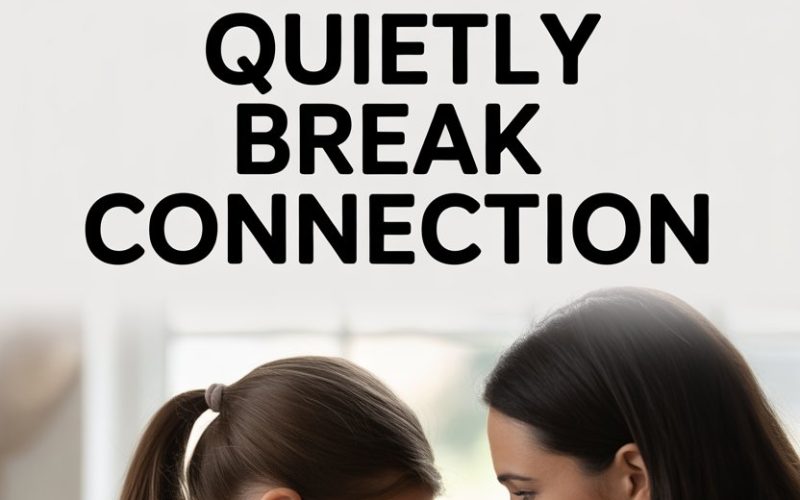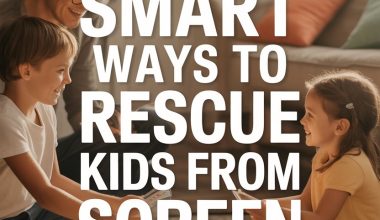Ever had that moment when your child is rattling off their day, and you’re nodding while mentally composing your shopping list, checking your inbox, and trying to remember if you left the iron on?
Welcome to parenthood—where presence is a rare currency, and the coffee never seems strong enough.
Turns out, some everyday habits can chip away at our bond with our kids, even if we adore them more than a hot cuppa on a chilly morning.
Let’s have a look at five sneaky connection-breakers, and swap them for habits that make our relationships as sturdy as a pair of school shoes in week one.
1. The Art of Half-Listening
You know the drill. Your little one is recounting the intricate politics of the playground or a teen is debriefing last night’s group chat drama, but you’re only catching every third word.
Maybe you’re stirring the pasta or half-watching the telly.
Half-listening wears a very convincing disguise: it looks productive (multitasking!) and feels necessary (life is busy).
Yet, children are like tiny emotional radars—they pick up on distracted energy faster than you can say, “Hang on, just let me finish this email.”
Research from the University of Washington shows that even young children can tell when our attention drifts.
The result? They feel less seen, less valued, and may eventually stop sharing altogether. Sounds dramatic, but even the tiniest “uh-huh” given with eyes glued to a screen adds up.
What to try tonight:
Set down the phone. Turn down the stove for 90 seconds. Make eye contact and show them you’re all ears—even if your brain is still unpacking work emails.
You might be amazed at how quickly their stories get juicier with your genuine attention.
2. The Tyranny of the To-Do List
Modern parenting often feels like a 24/7 project management gig. There’s always something to tick off: school forms, sports kit, dentist appointments, laundry that appears to multiply like rabbits.
With this endless stream, it’s easy to slip into “manager mode,” where instructions fly faster than compliments.
The day becomes a series of logistical hurdles, and family time feels like a project deadline. No one’s heart swells from being efficiently micro-managed.
According to Dr. Shefali Tsabary, connection thrives when we step out of taskmaster mode and into moments of shared joy, silliness, or even just lazy togetherness.
Kids don’t remember how quickly you packed their lunch—they remember the five minutes you spent giggling over a ridiculous joke you made up together.
What to try tonight:
Pause the checklists for a brief window after dinner.
Even a few minutes of unstructured “just us” time (tickling, Uno, wrestling the dog for the TV remote) can remind everyone you’re in this together, not just cohabiting a calendar.
3. The Praise Trap
Wait, isn’t praise good? Absolutely!
Except when it becomes the only thing kids hear from us—“Good job!” “Well done!” “That’s amazing!”—for every routine effort, or when we smother them with approval for achievements but go silent on the hard stuff.
Experts like Dr. Carol Dweck point out that blanket praise can turn connection into a transaction: kids perform, we clap, repeat.
It’s supposed to boost self-esteem, but too much can leave children craving approval rather than genuine connection.
Even trickier: Overpraising can make children anxious about failing or less willing to try new things. The real magic happens when we show interest in the process, not just the outcome.
What to try tonight:
Instead of the usual “You’re so clever!” try, “You worked really hard on that drawing. Tell me how you decided to use those colours.”
It invites conversation, not just applause, and reminds your child you’re interested in them, not just their achievements.
4. Silent Treatments and Cold Shoulders
Everyone’s had that moment—a child has pushed every button, and instead of yelling (progress!), you opt for stony silence. A little peace and quiet, you tell yourself, is probably for the best.
Trouble is, kids don’t interpret adult silence as “Mum/Dad needs a breather.” They read it as rejection.
The Child Mind Institute warns that stonewalling can leave children feeling isolated and unsure about how to repair the relationship.
Conflict is part of family life. Connection isn’t about avoiding bumps, but about how we come back together after them.
Repair builds trust—the safety net kids need most.
What to try tonight:
If you’re at the end of your rope, tell your child you need a minute to cool down, but you’ll talk about it soon. Later, circle back. “I was really upset earlier, but I want us to talk about what happened.”
That bridge, even a rickety one, is what keeps connection alive.
5. Living in ‘Fix-It’ Mode
Parents are professional problem-solvers. Did someone spill paint on the carpet? Pass the wipes. Friendship wrangle at school? Here’s three solutions and a snack.
It’s a loving instinct, but jumping in with fixes every time can quietly send the message: “Your feelings are problems to be solved.”
Children (and teens—oh, especially teens) often need empathy more than answers. The most connecting thing sometimes is simply sitting with them in their discomfort.
According to psychologist Dr. Lisa Damour, reflective listening—naming and validating feelings—nurtures trust far more than a list of solutions.
What to try tonight:
When your child comes to you with a problem, try responding with, “That sounds rough. Do you want to talk more about it, or do you want help brainstorming?”
It’s not magic, but it opens the door for emotional connection instead of just ticking off another fix.
Building Bridges, Not Walls
Every parent has slipped into these habits. Connection isn’t about getting it perfect every time, but about trying again—one “I see you” moment after another.
Children don’t need superhero parents. They need us: flawed, funny, muddling through, but always reaching out for that next conversation, cuddle, or shared eye-roll over the chaos.
It’s the little course corrections—tonight, tomorrow, next Tuesday after football practice—that keep connection alive.
The good news? Most of these habits have quick fixes.
Sometimes it just takes a deep breath, a look away from the screen, or a willingness to listen—really listen.
Kids don’t remember perfect days; they remember the moments they felt chosen.
Turns out, the strongest bonds are built not on grand gestures, but on hundreds of small acts of presence. And perhaps, a really good joke about the state of your fridge.
Now, who’s up for a round of Uno?




